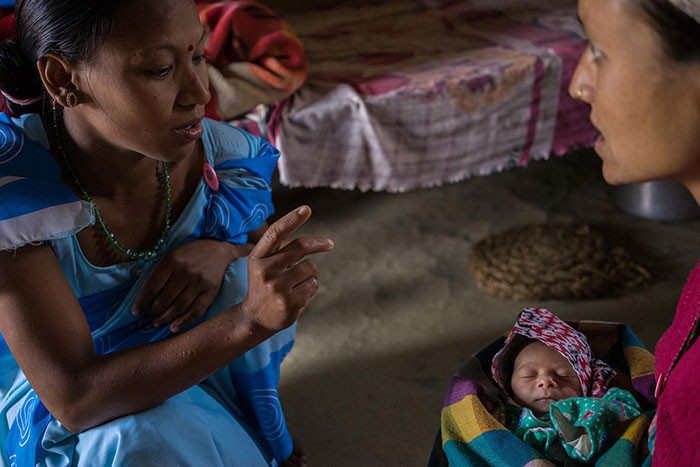- What We Do
- Agriculture and Food Security
- Democracy, Human Rights and Governance
- Economic Growth and Trade
- Education
- Ending Extreme Poverty
- Environment and Global Climate Change
- Gender Equality and Women's Empowerment
- Global Health
- Water and Sanitation
- Working in Crises and Conflict
- U.S. Global Development Lab

The U.S. Agency for International Development (USAID) is working with partners around the world to improve maternal and child survival. In the Acting on the Call reports, USAID details that by scaling up high-impact interventions, we can work with partners to save 15 million children and 600,000 women between 2012 and 2020.
To achieve this goal, USAID works with partners across multiple sectors of society and employs a diverse portfolio of interventions, including social and behavior change approaches.
Social and behavior change interventions contribute to the Agency's efforts to prevent child and maternal deaths by:
- Increasing the rates of use of oral rehydration salts and zinc for children with diarrhea to the levels of "best performer" countries would save the lives of more than half a million children.
- Handwashing with soap could prevent nearly half a million child deaths.
- Exclusive breastfeeding through the first 6 months would save a quarter of a million infants.
USAID works through a number of projects and programs to employ social and behavior change approaches in our efforts to prevent child and maternal deaths:
- Accelerate. As part of USAID's TRANSFORM project, Accelerate expands the capabilities of stakeholders in 25 focus countries to implement high-quality behavior change programming by focusing on 10 Accelerator Behaviors, ensuring these efforts are integrated into stakeholders' health strategies. The project supports evidence-based program design and implementation; emphasizes near real-time tracking, monitoring and evaluation; and shares tools and best practices across USAID's network of partners.
- Peace Corps Interagency Agreement. Through partnership with the Peace Corps, USAID will equip Peace Corps Volunteers to promote health behaviors for maternal and child health in 12 of the 25 focus countries. Through targeted training events, sub-regional workshops, and customized technical assistance, Peace Corps will introduce staff, volunteers, and their counterparts in these 12 countries to new and effective interventions to promote key messages and stimulate behavior change with individuals, families, and communities at a volunteer's site.
- White House Social and Behavioral Sciences Team. Building on a strong partnership since 2014, the Social and Behavioral Sciences Team is launching expanded work with USAID missions and local organizations to implement and rigorously evaluate behavior change interventions and activities for newborn, child, and maternal health and nutrition in support of EPCMD objectives. The partnership focuses on identifying effective and efficient interventions that promote accelerator behaviors for a range of health outcomes in priority countries, providing assistance in the design of behavioral interventions, using administrative data sources, implementing rapid low-cost rigorous evaluations, and generating rigorous evidence, which can be immediately applied.
- Global Public-Private Partnership for Handwashing. USAID is a founding member of the Global Public-Private Partnership for Handwashing (PPPHW), a coalition of public, private, and academic organizations that aims to drive forward, develop, and share knowledge that strengthens handwashing implementation. USAID was integral to the founding of the PPPHW in 2001 and has played an important role in ensuring its longevity. In addition to international advocacy initiatives and building political leadership, the PPPHW fosters innovative approaches to the promotion of handwashing through social and behavior change activities, such as the annual Handwashing Behavior Change Think Tank.
- WHO Roadmap for Building, Reporting, Assessing, and Applying Evidence for Social, Behavioral, and Community Engagement Interventions. A World Health Organization (WHO)-led collaboration that includes USAID, United Nations Children's Fund (UNICEF), United Nations Population Fund (UNFPA), Norwegian Agency for Development Cooperation (NORAD), National Institutes of Health (NIH), and the Norwegian Institute of Public Health is working to improve how the social and behavior change field builds, reports, assesses, and applies the evidence base for social, behavioral, and community engagement interventions for maternal, newborn, and child health. This work will strengthen the WHO guideline development process; develop a prioritized global research agenda on new interventions, improved interventions, and the delivery of existing interventions for maternal, newborn, and child health; develop guidance for developing prioritized country-level research agendas; and test reporting standards for intervention research and programs.
By implementing social and behavior change interventions alongside biomedical and other interventions, USAID works to ensure the effectiveness and the efficiency of our maternal and child survival efforts.








Comment
Make a general inquiry or suggest an improvement.